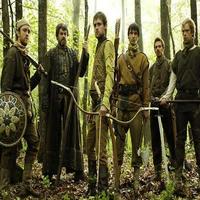
The Merry Men
CBUB Wins: 0
CBUB Losses: 0
CBUB Ties: 0
Win Percentage: 0%
Added by: Redemption X
Read more about The Merry Men at: Wikipedia
Official Site: Public Domain
The Merry Men are the group of outlaw who followed Robin Hood, according to English folklore. An early use of the phrase "merry men" occurs in the oldest known Robin Hood ballad, "Robin Hood and the Monk", which survives in a manuscript completed around 1450. The word "merry" in this and other ballads is probably used in the archaic sense meaning "companion or follower of an… outlaw". The early ballads give specific names to only three of Robin's companions, Little John, Much the Miller's Son, and William Scarlock or Scathelock, the Will Scarlet of later traditions. Joining them are between 20 and "seven score" (140) outlawed yeomen.
The most prominent of the Merry Men is Robin's second-in-command, Little John. He appears in the earliest ballads, and is mentioned in even earlier sources, such as Andrew of Wyntoun's Orygynale Chronicle of around 1420 and Walter Bower's expansion of the Scotichronicon, completed around 1440. Later ballads name additional Merry Men, some of whom appear in only one or two ballads, while others, like the minstrel Alan-a-Dale and the jovial Friar Tuck, became fully attached to the legend. Several of the Robin Hood ballads tell the story of how individual Merry Men join the group; this is frequently accomplished by defeating Robin in a duel.
CBUB Match Record:
No Regular Play Records Available
No Fantasy Draft Records Available
